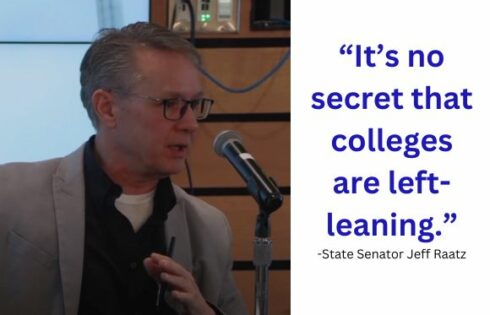
Renown scholar Victor Davis Hanson explains why such a move would be a mistake
Classics faculty at Oxford University have proposed that two ancient epics from its introductory class be dropped in order to “reduce attainment gaps.”
First reported by the Oxford Student, the classics faculty at the storied English university has proposed the removal of Homer’s “The Iliad” and Virgil’s “Aeneid” from its “first stage of the classics degree, known as ‘Moderations,’ or ‘mods.’”
The “Mods” course, the Student reported, is “assessed by a set of ten exams” and had been “increasingly criticised in recent years, due to the attainment gaps found between male and female candidates.”
Taking out the two ancient classics will supposedly “reduce the attainment gaps and thus improve access to the subject.”
The College Fix has asked Oxford to clarify whether it was males or females who did poorly testing on the ancient tomes, as well as when a decision will be made on whether the two stories will be axed.
The Student reports that many have questioned why solving the achievement gap means removing Homer and Virgil.
A professor at Oxford told the Student that the proposal had come as a result of a “extensive analysis of course data and discussions across the Faculty” for nearly a year.
The goal of the department’s reforms is to “offer a course which is equally stimulating and engaging for all types of applicant, in line with the university’s commitment to recruit and support students of outstanding potential at all levels, whatever their background,” said Professor Jonathon Prag.
In an email to The College Fix, Stanford professor Victor Davis Hanson, the co-author of the 1998 book “Who Killed Homer? The Demise of Classical Education and the Recovery of Greek Wisdom,” expressed bewilderment that the “center of all classical learning would even consider watering down their ancient standards that have served the Western world of classical studies so well.”
“Without knowledge of Homer, one has no idea of the world of the early emerging polis of the late 8th-century,” Hanson said. “Virgil is likewise the font of all Classical Latin literature; his Eclogues are the model of pastoral poetry for the next 2,000 years; his Georgics a continuation of Hesiod’s praise of farming and country life.”
Without knowledge of Virgil’s Aeneid, Hanson said, “one has no knowledge of the Augustan revolution, the idea that Romans could transfer successfully Greek literature into Latin genres, or the influence of Virgil on later European poets and indeed upon Christianity itself.”
The educational cost is similar for omitting Homer.
“Homer is our first extant Greek literature (the Greeks called Homer’s work the Biblos the ‘book’), and his two surviving orally composed epics form the basis of all later literary expression. Without knowledge of the Iliad and Odyssey, one cannot fathom later Greek lyric poetry, Greek tragedy, or epic—or the nature of Greek literature and culture itself,” Hanson said, adding:
As an American, I have no idea, only a vague notion that race/class/gender political correctness had infected the Anglo-American campus and the effects, as John Heath and I wrote about in Who Killed Homer? (The title was apparently prescient) over 20 years ago. Neither Homer nor Virgil, in the pantheon of classical literature, is considered especially difficult to read in the original, especially in comparison to challenging authors such as Aeschylus and Thucydides, or Latin writers such as Propertius, Juvenal and Tacitus. Is it as if by decapitating the fonts of classical learning, thereby classical learning is relegated to an inferior academic status?
Hanson said he is “unsympathetic” to the idea of lowering standards in curriculum, saying that students “must make the necessary adjustments to meet necessary standards, such as summer study and extra tutorials.”
“Students today have much to learn from the ancient classics,” Hanson told The Fix.
The protagonists of the two stories under scrutiny at Oxford “form the archetypes of the epic and tragic hero—of literary characters and by extension the human condition—who must play out a destiny in which they accept that their own fates will not end well. Finding courage and purpose in a doomed fate resonates to humans of all walks of life.”
“For the next two millennia, everything from Sophoclean and Shakespearian tragedy to John Ford’s Westerns follow from these models of the the tragic hero.”
Students today “rarely” get to read translations of these great epics, Hanson went on, blaming the “assault on Western Civ as a formal general education course and the Humanities in general.”
“But of course,” he added. “We are speaking here of literature in translation. No one in his right mind would have dreamed that classicists themselves would commit disciplinary suicide by dropping Homer and Virgil from the classics reading list.”
Hanson hypothesized that the writings of Thucydides and Aeschlyus would be the next to hit the chopping block, as they are “more difficult texts that undergraduates often struggle with.”
MORE: Oxford eases admissions standards for poor students with average grades
MORE: Wake Forest offers ‘beyond whiteness’ classics curriculum program
IMAGE: Vipman / Shutterstock
Like The College Fix on Facebook / Follow us on Twitter




Please join the conversation about our stories on Facebook, Twitter, Instagram, Reddit, MeWe, Rumble, Gab, Minds and Gettr.